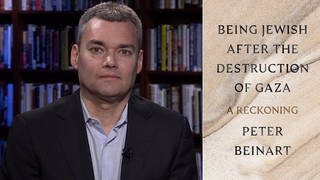
Related
To mark World Water Day 2005, we take a look at the issue of water privatization in this country in California and Michigan. We speak with activists from Stockton and Detroit and an independent filmmaker who produced the documentary, “Thirst.” [includes rush transcript]
Today is World Water Day 2005.
- “Thirst”, excerpt of documentary on global water issues.
The United Nations says more than 1.1 billion people around the world lack safe water and 2.4 billion have no access to sanitation–leading to over 3 million deaths every year. Almost one fifth of all children–lack even the bare minimum of safe water they need to live.
Water issues extend to indigenous people’s rights, global warming and boundary issues. Today, we focus on the issue of water privatization in Detroit and Stockton, California.
In mid-2003, a 600 million dollar utilities privatization contract handed operating control of the Stockton water, wastewater and stormwater systems to international conglomerate OMI-Thames. The Stockton City Council voted on the contract amid public outcry. This is an excerpt from the documentary “Thirst.” It begins with OMI president Don Evans speaking in front of the Council.
- “Thirst”, excerpt of documentary.
Following the city council vote, the Concerned Citizens Coalition of Stockton, the Sierra Club, and League of Women Voters filed a lawsuit to stop the privatization of the city’s water, wastewater, and stormwater utilities. They argued that under California’s Environmental Quality Act the city should have completed an environmental impact statement before approving the contract. In an extraordinary ruling, Superior Court Judge Robert McNatt threw out the privatization in December 2003, writing that approval of the contract was “an abuse of discretion by the City Council.”
The City has appealed the ruling and also asked Judge McNatt to order a new trial. The Concerned Citizens Coalition of Stockton have appealed that ruling and now both appeals are pending.
- Dezaraye Bagalayos, member of the Concerned Citizens Coalition of Stockton.
- Alan Snitow, independent filmmaker. He is the co-producer and director of the documentary “Thirst” with Deborah Kaufman.
- Maureen Taylor, state chair of the Michigan Welfare Rights Organization. She is in the race for a city council seat.
For more information on global water issues: “Reclaiming Water” (2003), a documentary on The Third World Water Forum by Democracy Now technical director Angela Alston.
Transcript
AMY GOODMAN: Today is Water Day, 2005.
PRINCE HARUHITO OF JAPAN: Water is now in a stage of crisis. And due to the rapid increase of the world’s population, this situation is expected to become even more serious.
GERARD PAYEN: The challenge here is to provide access to all the unserved people at an affordable price. My experience as a water professional is that it is possible. It is possible, but there are conditions.
MAUDE BARLOW: The political question really is who owns water and who gets to control water. Here you’re going to hear or you are hearing two very, very different visions of a future for water. On one side are those who see water as an economic good, to put water on the open market for sale to the highest bidder. On the other hand, you’re going to hear the voice of a growing civil society movement, who has a vision of water as the part of the Global Commons and treat it as a public trust for all time, by governments everywhere.
PABLO SOLON: People were killed by the army because what you’re saying here.”
PETER WOICKE: Somebody has to pay for water, ladies and gentlemen. Whether it’s the users or the future generations, that is the reality.
AMY GOODMAN: An excerpt of the documentary, Thirst, produced by Alan Snitow and Deborah Kaufman. This year, World Water Day marks the launching of the Water for Life decade, during which the United Nations and governments are seeking to have the number of people without access to safe drinking water and basic sanitation by the year 2015. The United Nations says more than 1.1 billion people around the world lack safe water, and almost 2.5 billion have no access to sanitation, leading to over three million deaths every year. Almost a fifth of all children lack even the bare minimum of safe water they need to live. Water issues extend to indigenous people’s rights, global warming and boundary issues. Today, we focus on water privatization here in this country, in Detroit and Stockton, California. In mid-2003, a $600 million utilities privatization contract handed operating control of the Stockton water, wastewater and stormwater systems to international conglomerate, OMI Thames. The Stockton City Council voted on the contract amid public outcry. This is an excerpt from the documentary, Thirst. It begins with OMI President, Don Evans, speaking in front of the Council.
DON EVANS: To safeguard the water of Stockton, you have the absolute commitment of our company and you have the commitment of Thames Water to deliver this contract effectively. That’s also, as the president, my personal commitment to you.
STOCKTON RESIDENT: It’s clear that the decision to privatize has been made covertly without a public vote.
STOCKTON RESIDENT: I don’t think the people at home realize how many hundreds of people were here and that it’s all filled up back here and downstairs, and that it was hard to hear, so I appreciate [inaudible].
DEZARAYE BAGALAYOS: City Council Members, by signing this contract without the vote of the people, you will be betraying the people you supposedly represent. Water is life. This company, OMI Thames, wants to profit from our water. Water for life, not for profit.
STOCKTON RESIDENT: I’m ashamed that we’ve followed this path and have gone down the road at making something happen that was not consensus building, not citizen-involved. It was basically handed down as a dictate. This is not the principle of an All-America City.
MAYOR PODESTO: Ok, Council Member Giovanetti.
COUNCIL MEMBER GIOVANETTI: Thank you. I’m prepared to approve this contract tonight, ahead of the so-called vote of the people.
COUNCIL MEMBER: There comes a time when the people become so involved in an issue that it is important that they be heard by way of the ballot.
COUNCIL MEMBER NOMURA: As a Christian, I’ve always felt that prayer is very powerful. And when this process began, I’ve always prayed for guidance in what I should do. It says that in the Constitution, that you will elect representatives to vote and to make decisions that are best for you.
COUNCIL MEMBER MARTIN: We’ve not been elected to baby-sit and maintain the city until a vote can be taken by the citizens on major issues.
COUNCIL MEMBER: I do not feel they are too dumb to understand.
COUNCIL MEMBER MARTIN: Nobody said that.
COUNCIL MEMBER: And you know, the people who founded this Republic obviously didn’t think the people were too dumb to run it.
COUNCIL MEMBER MARTIN: Neither Lorrie and I or anyone on this council believes that the people are too dumb to resolve or to understand the issue. That’s not — that’s not what we’ve said.
MAYOR PODESTO: Alright, quiet down. Officers, close the door, please. Tonight I want to thank the council for their indulgence and their endurance and their hard work to come up with whatever their answers are tonight. Do I believe that this should go to a vote of the people? Absolutely not. And that’s for no more reason than I can think any government by initiative is good. There’s been a motion and a second. I’m calling for the question. Please cast your votes. Carries 4-3. Thank you all for your hard work.
AMY GOODMAN: And that was the former Mayor of Stockton, Podesto. They did vote to privatize the water supply, but that was in 2003. This an excerpt of the film, Thirst, that’s playing around the country. We’re joined by one of its producers, Alan Snitow, by Dezaraye Bagalayos, a member of the Concerned Citizens Coalition of Stockton. Can you tell us what happened since then?
DEZARAYE BAGALAYOS: Right now the lawsuit—after they voted we did a — we went around and collected signatures, basically to put a stop to it. And unfortunately, we failed, we failed. We came up short with the signatures. So we ended up taking them to court over it. And it’s been in court since then, we’re in the appeals process. On the 28th of this month, it goes to the State Appellate Court. So we’re just, we’re waiting to see what the courts have to say.
AMY GOODMAN: Very briefly, why are you against it? The privatization of water?
DEZARAYE BAGALAYOS: Why am I against the privatization? Because first of all, it was the one municipality of our city that was making money for the city. And it’s not that even at all. There was no reason to privatize it, ever. And what it comes down to is that, ever since this has happened, there’s been absolutely no accountability. We’re losing more water. You know, there’s more water missing that’s not accounted for. The service has gone to hell, basically. They promised a 24-hour hotline, and if you call that hotline number, the number is disconnected, or you get rerouted to the fire department. I mean, what it comes down to is that at once like, you know, we had access to this and now that access is gone, because you’re dealing with a multinational company, and the rules are different.
AMY GOODMAN: Let me ask Alan Snitow. What happened to the mayor?
ALAN SNITOW: The mayor ran for higher office in the most expensive state legislative campaign in American history. And he lost, and he lost even in the areas of Stockton itself. And the privatization of water and the controversy around that was a major reason for his defeat. Because what people thought was, that this issue about who controls water is really one of the fundamental issues of democracy. And as you see in the film, they’re all talking about whether the people get a right to decide or not. And this is what’s happening now, really all over the world, as the major multinational corporations, among the hundred largest in the world, are really taking over water supplies very fast, with the idea that this is the oil of the next century.
AMY GOODMAN: Maureen Taylor also joins us on the line. She’s State Chair of the Michigan Welfare Rights Organization, in a race for a City Council seat in Detroit. Can you talk about privatization of water there?
MAUREEN TAYLOR: Yes. We’re in another phase of this fight. The privatization of water concept here is being operated under the guise of shutting off water for residents of the City of Detroit. In the last 90 days of the year 2004, the Water and Sewage Department, which is a municipal-owned entity, shut off water at 6,200 additional households in just 90 days. So what’s happening here, because we have such a horrible decline in the amount — the numbers of people that are working, and we have a horrible increase in the number of people that are having to seek government assistance and welfare and what not; you’re being punished because you’re poor. Here, you can have your water turned off, and at some point, the whole question of privatization, meaning an explicit company or corporation is going to be brought in by the water czar, Mr. Victor Mercado, to run the Water Department.
AMY GOODMAN: The company that wants to take it over?
MAUREEN TAYLOR: There are many. We live inside of the Great Lakes. There’s no end to the amount of great water and fresh water that’s available to folks here. So there are numbers of people — it’s like sharks, it’s like Jaws. There’s a feeding frenzy going on here. So by having this entire crisis, 40,000 people shut off of water between June of 2001 and June of 2002. 40,000 in just Detroit. And along with this additional 6,000, you create this chaos and whatnaut that’s going on in this, the Motor City. Then you have folks that are standing on the periphery saying, I can run this better. And if the citizens will pay me and pick me, and the elected officials will choose me to be the water company and whatnaut, then I can make the water better. But of course I can make my pockets better, too.
AMY GOODMAN: We have 15 seconds. Alan Snitow, how does Detroit fit into the global picture?
ALAN SNITOW: Well, a little bit we’re talking about a case in Florida right now in which one woman is getting the attention of Congress about cutting off her food tube. Thousands of people are being cut off from water in Detroit and many other cities around the world right now. And this all comes together on the question of who is going to control this resource in the future? Enron was a water company. Uruguay has just voted against having any water privatization there. This is a global issue now, and we’ve got new Enrons on the horizon and the area is water rather than energy.
AMY GOODMAN: I want to thank you for joining us on this World Water Day. Dezaraye Bagalayos from Concerned Citizens Coalition of Stockton, Alan Snitow, with Deborah Kaufman, made the film Thirst. Their website is thirstthemovie.org, and Maureen Taylor, Michigan Welfare Rights Organization.












Media Options